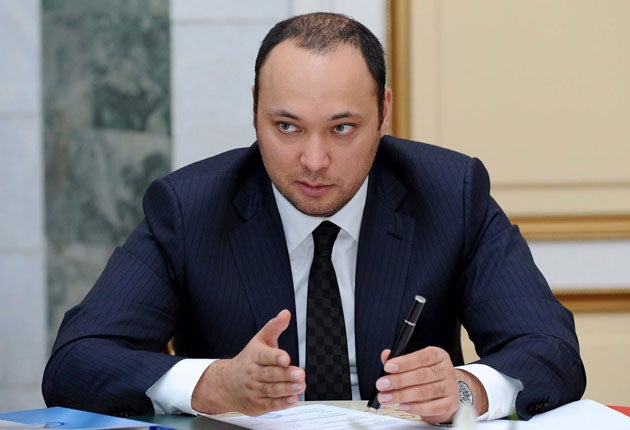UK allows ousted Kyrgyz president's son to stay for now
Bishkek to demand that Britain extradite Maxim Bakiyev, accused of embezzling millions

Your support helps us to tell the story
From reproductive rights to climate change to Big Tech, The Independent is on the ground when the story is developing. Whether it's investigating the financials of Elon Musk's pro-Trump PAC or producing our latest documentary, 'The A Word', which shines a light on the American women fighting for reproductive rights, we know how important it is to parse out the facts from the messaging.
At such a critical moment in US history, we need reporters on the ground. Your donation allows us to keep sending journalists to speak to both sides of the story.
The Independent is trusted by Americans across the entire political spectrum. And unlike many other quality news outlets, we choose not to lock Americans out of our reporting and analysis with paywalls. We believe quality journalism should be available to everyone, paid for by those who can afford it.
Your support makes all the difference.Britain has granted the controversial son of the toppled leader of Kyrgyzstan temporary leave to remain in the country. Maxim Bakiyev, the multi-millionaire son of Kurmanbek Bakiyev, arrived in the UK last week and is claiming asylum.
Mr Bakiyev, 32, has been accused of embezzling millions of dollars from government funds. He is also said to be responsible for fomenting Kyrgyzstan's recent inter-ethnic violence in which as many as 2,000 people may have died and hundreds of thousands were forced to flee their homes.
The US assistant secretary of state for central Asia, Robert Blake, called for an international investigation yesterday into the possible causes of the violence and for Kyrgyzstan to create conditions for a safe return of the refugees.
In a statement yesterday Mr Bakiyev denied the charges levelled against him. "I have been forced into exile in fear for my life," he said. "The interim government in Kyrgyzstan accuses me of new crimes every day. The charges are bogus, to divert attention from their own crimes. They accuse me before there has been any opportunity for an investigation. Clearly, they seek to try to make me a scapegoat for the chaos in the country. I view events in my homeland with horror and pray for an end to the violence."
Mr Bakiyev arrived in Britain last week after travelling by private jet to Farnborough, Hampshire, and immediately requested asylum, according to his lawyers. "Following interviews conducted in accordance with immigration rules, Mr Bakiyev was screened in accordance with normal procedures for port-of-entry asylum claims, and then granted temporary admission pending the consideration of his claim," a spokesman said.
The interim Kyrgyz government will press Britain to deny Mr Bakiyev asylum and extradite him. They have already threatened to close the US airbase, sited in the north of the country, unless he is returned. The airbase is a vital part in the resupply logistics for Nato's Afghanistan operation. A small demonstration demanding Mr Bakiyev's return was held outside the building that houses representatives of the UK's Department for International Development in Bishkek, the Kyrgyz capital. Britain does not have an embassy there.
Officials accuse Mr Bakiyev of embezzling part of a £204m Russian loan to Kyrgyzstan and of "irregularities" in his management of the US airbase. According to a spokesman for the Kyrgyz prosecutor general's office, a criminal case was launched against Mr Bakiyev in May. Before arriving in Britain, Mr Bakiyev, the former head of the Kyrgyz Central Agency for Development, was believed to have travelled to one of the Baltic states. An arrest warrant on fraud charges was issued through Interpol after he disappeared from the country.
His father, the deposed president, left Kyrgyzstan in April after a violent revolt amid allegations of corruption resulted in fighting in which dozens of protesters died. He is currently in exile in Belarus.
Since then, more than 400,000 people, mainly women and children, have been displaced and are now living in cramped and squalid refugee camps on the borders of Kyrgyzstan and Uzbekistan, while reports of rapes and beatings have shot up. Last week ethnic fighting continued, and aid is being flown in, but tens of thousands are said to be without water or food.
The UN yesterday announced a £48m appeal for Kyrgyzstan. The UN Secretary General, Ban Ki-moon, said there were shortages of food, water and electricity and warned that hospitals are running low on supplies.
John Holmes, head of the UN Office for the Co-ordination of Humanitarian Affairs, urged "a "generous and rapid response" from donors. "I have been shocked by the extent of the violence and appalled by the deaths and injuries, widespread arson, sexual violence and looting," he said.
Join our commenting forum
Join thought-provoking conversations, follow other Independent readers and see their replies
2Comments